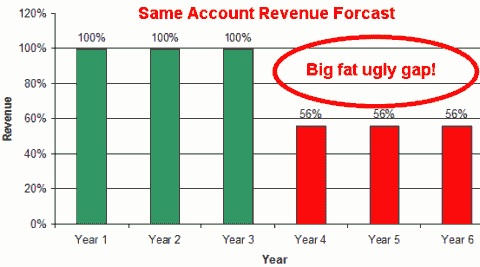When licensing gets in the way of sales and revenue what will happen?
All public listed companies are infected with a serious virus of the type " You-must-grow-your-revenue-or-die". The stock markets punish "flat earnings" more severely than posting a loss. Well flat earnings could read: we made 10 Billion last year, we make another 10 Billion this year and voila your stock goes south. So every enterprise is looking to grow revenue. While acquisitions are very much in fashion to grow revenue, the core strategy falls into two categories: upsell your existing customer base and acquire new customers. As long as your market is expanding rapidly adding new customers is rather easy. Once markets mature adding new customers means taking them away from your competitors which is costly and tedious (including fending off their retaliation attacks). So "upselling your customer base" is the save bet for most sales organisations.
In software sales revenues are very unpredictable if you just sell licences. So every vendor tries to sell maintenance too. To help customers some offer to spread the up-front payment for licences over the period of a maintenance agreement (typically three years). After that period the licence is paid you only need to continue to pay maintenance and support which would be around half. So once you look at a six year period your cost look like this:

Of course: your cost is the software vendors revenue. Uupps. Didn't we just conclude, that "upselling your customer base" is the easiest way to increase revenue? With that little "spread your payment" option the vendor has build in a gap they need to fill with new products. As long as you create new offerings, that create additional value for the customers, that actually might work. But what do you do if you just want to ship an upgrade to the product the customer has under maintenance? One way is to split your licences into "Standard" and "Enterprise". Then you explain to your customer: "What you have under maintenance is equivalent to the new standard edition, all the new features you cherish are part of the new Enterprise edition". Of course the Enterprise edition requires a new licence -- and hooray your revenue gap is plugged. You even might get away with it. Your customer is used to have paid 100 for the last three years, so they probably have forgotten, that IT cost are supposed to go down and have budgeted 100 for year four to six. With the myopic view on quarterly results and high job rotation that is not difficult to imagine (no Samsung product needed here).
However your customer might start to remember and really starts to run the numbers and ask some questions. My favourite: "Why do I need maintenance on the operating system? We keep desktops for 3 years and don't upgrade them. 100% of our machines use the operating system our hardware vendor had preinstalled."
Then finally your customers might listen to Michael Sampson.
In software sales revenues are very unpredictable if you just sell licences. So every vendor tries to sell maintenance too. To help customers some offer to spread the up-front payment for licences over the period of a maintenance agreement (typically three years). After that period the licence is paid you only need to continue to pay maintenance and support which would be around half. So once you look at a six year period your cost look like this:

Of course: your cost is the software vendors revenue. Uupps. Didn't we just conclude, that "upselling your customer base" is the easiest way to increase revenue? With that little "spread your payment" option the vendor has build in a gap they need to fill with new products. As long as you create new offerings, that create additional value for the customers, that actually might work. But what do you do if you just want to ship an upgrade to the product the customer has under maintenance? One way is to split your licences into "Standard" and "Enterprise". Then you explain to your customer: "What you have under maintenance is equivalent to the new standard edition, all the new features you cherish are part of the new Enterprise edition". Of course the Enterprise edition requires a new licence -- and hooray your revenue gap is plugged. You even might get away with it. Your customer is used to have paid 100 for the last three years, so they probably have forgotten, that IT cost are supposed to go down and have budgeted 100 for year four to six. With the myopic view on quarterly results and high job rotation that is not difficult to imagine (no Samsung product needed here).
However your customer might start to remember and really starts to run the numbers and ask some questions. My favourite: "Why do I need maintenance on the operating system? We keep desktops for 3 years and don't upgrade them. 100% of our machines use the operating system our hardware vendor had preinstalled."
Then finally your customers might listen to Michael Sampson.
Posted by Stephan H Wissel on 31 October 2006 | Comments (1) | categories: Software